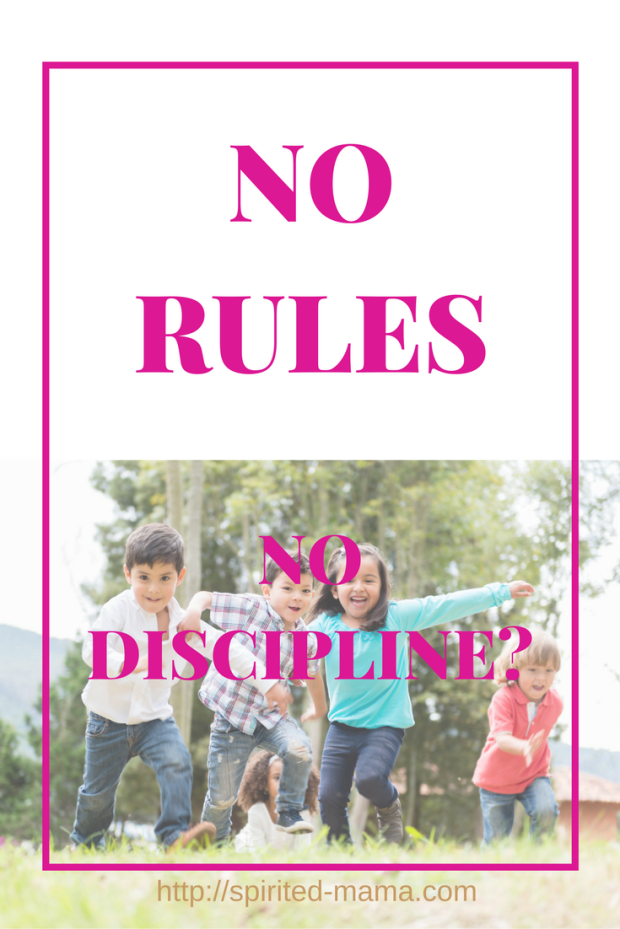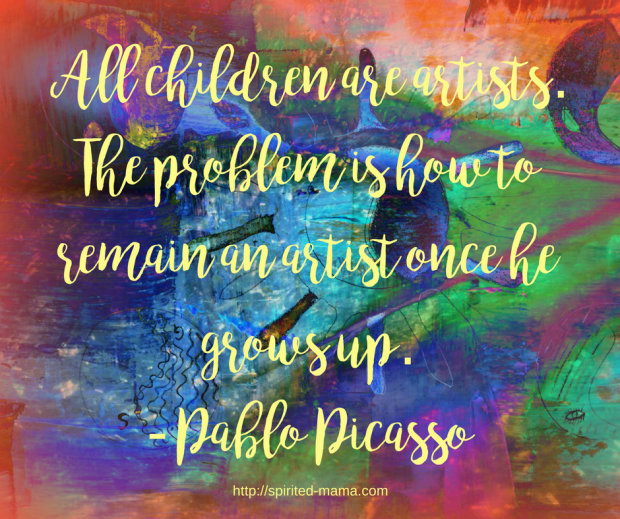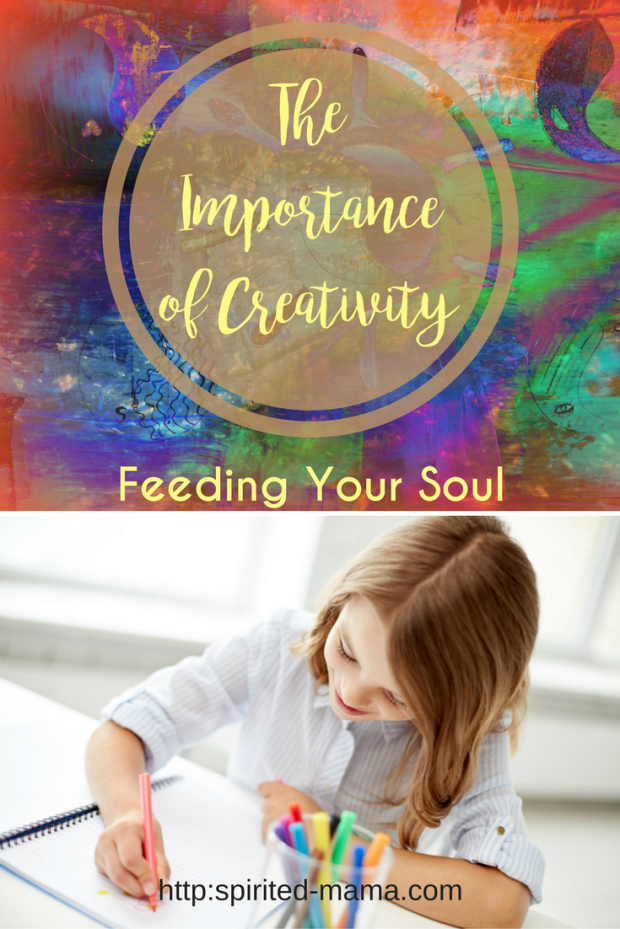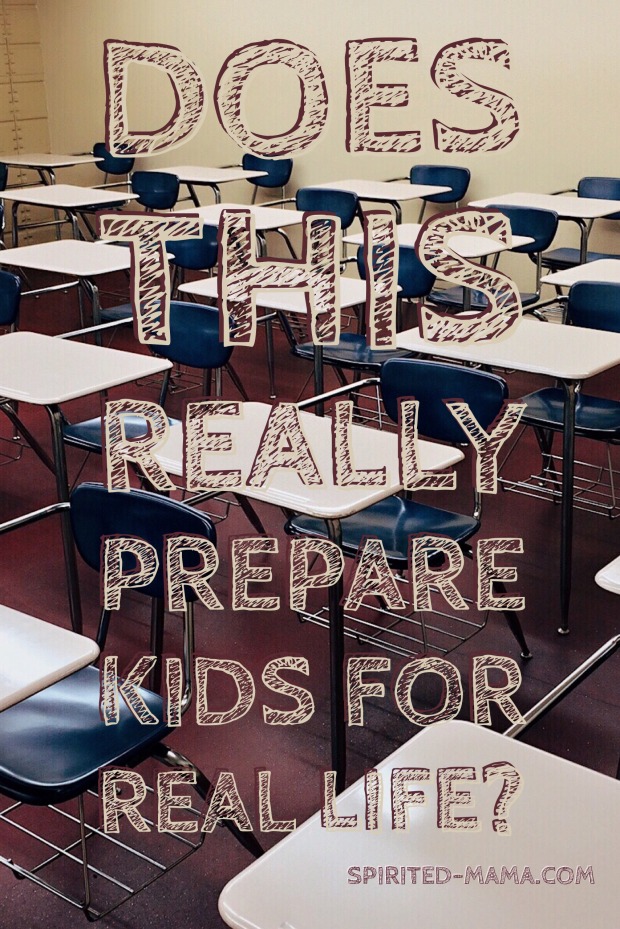If you watched Channel 4’s documentary, Feral Families on Thursday 26th October, and have never come across the ideas of positive/unconditional parenting or unschooling before, you would be forgiven for thinking that “no-rules-families” (btw, this isn’t a “thing”, no one uses this term. I have no idea why the filmmakers went with it – oh, yeah, sensationalism) have no boundaries and no discipline.
The narrator said this several times.
But I saw boundaries in the programme and I would bet my right arm that each family featured uses some form of discipline at times – it just might look completely different to the kind you would see in an authoritarian household.
Discipline has come to be synonymous with punishment.
But I would like to point out that rules are not the same as boundaries, and discipline is perfectly possible without punishment.
**This post contains affiliate links. You never pay more for anything you buy after following a link, but I may make a small commission that helps me to continue to bring you top quality content**
What Are Rules and Boundaries?
Let’s check the dictionary, shall we?
The Oxford English Dictionary defines “rule” as:
One of a set of explicit or understood regulations or principles governing conduct or procedure within a particular area of activity.
With the synonyms: regulation, ruling, directive, order, court order, act, law, by-law, statute, edict, canon, ordinance, pronouncement, mandate, command, dictate, dictum, decree, fiat, proclamation, injunction, commandment, prescription, stipulation, requirement, precept, guideline, direction.
Boundary, on the other hand, is defined as:
1.1 often boundaries A limit of something abstract, especially a subject or sphere of activity.
‘a community without class or political boundaries’
With the synonyms: dividing line, divide, division, borderline, demarcation line, line of demarcation, cut-off point, threshold, limits, parameters, bounds, outer limits, confines, extremities, barriers, thresholds.
They’re quite different, aren’t they?
They have different dictionary definitions and different real-world use too, different connotations.
I am in no way attempting to speak for any family other than my own here. If you disagree, I welcome respectful debate in the comments section. But what follows is an examination of my beliefs and the way our family works.
Unconditional Parenting
So, we parent positively, unconditionally, gently, respectfully. Pick a term. They all apply. The husbeast and I are not authoritarian by nature, well, not much. We certainly don’t believe that as parents our primary role is to rule over our children like monarchs over subjects. We don’t believe that our children are our property, we don’t own them. We believe that our children are individual humans with rights.
A revolutionary concept to some people, yes, but to us, it is simply common sense.
I really wish Feral Families had actually explored this concept properly, as I did feel it left the viewer with little better grasp of this parental philosophy than at the start. So let me try to explain what it means to parent in this way:
Far less catchy, but it might be more apt to say that families like ours avoid arbitrary rules. We tend to steer clear of the word “rules” in general because of the connotations attached. As I suggested above, the words “rules” and “boundaries” have different connotations, they feel different. To me, rules are fixed, immovable, inflexible and rigid. They are prescriptive and unresponsive.
Boundaries can change to suit changing circumstances, such as a child growing up. Boundaries are guidelines to help everybody grasp where the edges are, and within the playing field, they are free to roam.
This is the heart of our style of parenting.
We value freedom and exploration. But most importantly, we value respect. If we want our children to respect us, then we, as the adults with more life experience, must model respect by respecting our children.
It’s Not Cricket – Except When It Is
I can’t help but picture a cricket pitch (hubby will be proud to read this). Ok, so in case you aren’t familiar (hi there, American readers! I see you!) the boundary of a cricket pitch is a very long rope. It lies around the field of play and if the ball goes over it, the batting side gets extra runs (points). But it’s a rope, not a painted line. Guess what it does from time to time… it moves. It can get knocked, nudged, lifted, shifted. Got juniors playing on the field? Bring the boundaries in a bit. It makes the game fairer. They can’t be expected to hit the ball as far as the best adults in the country. Can they?

Do you know what else they do in cricket? The fielding team moves around. They don’t have fixed positions that they stay in for the entire innings. The bowler is planning a few short balls? He lets his teammates know so they can adjust their positions based on where the batsman is likely to end up directing the ball. There is all this flexibility in a game of cricket.
Fifteen years ago I would never have believed you if you told me that. I saw cricket as a long, boring game with TOO MANY RULES.
Well, do you know what? That’s what I think of traditional parenting now.
Do this, do that, go to bed, eat this, do it my way or the highway.
Nope, not for my kids. Giving orders, expecting compliance without taking the time to reason with or explain anything to children is utterly disrespectful of their autonomy and personhood.
I choose to respect them. I choose to give them choices and freedom. Do you know what happens when you do that? They are a) happy, and b) don’t go batshit crazy with rebellion as soon as they can.
Call me nuts, but I’d quite like my boys to have an open and trusting relationship with me when they hit their teens. I know?! Crazy, right? I actually want them to feel they can come talk to me if they have a problem.
When you have flexible, adaptable boundaries and everyone in the family understands the values (in place of rules) that you share, then you have more harmony, fewer battles, fewer upsets.
What is “Well-Behaved” Anyway?!
I’ve been told several times this week that my kids are extremely well-behaved. It’s cropped up repeatedly in a few short days for some reason. Part of me is thinking ”yeah, right now, but you’re not with them all the time! They have their moments!” Of course they do, they are kids! They have upsets, they have disagreements and they are still learning – they are kids!
Do adults never get overwhelmed by their emotions? Do adults never fall out with one another? Of course they do. But does that make them “badly behaved?” Hardly. “Bad behaviour” in adults might include: breaking the law, public drunkenness, being rude.
I’ve been pondering what is meant by the people who choose to praise my kids in this way. I’ve been reflecting on what behaviour they have seen that leads them to say this, and what behaviour they might be comparing it to in order to reach the judgement that my kids are doing it “well”.
I hope it’s safe to say that my kids have never been drunk in public (or private – stop it!), nor have they broken any laws. But I’m not sure these well-meaning adults who have been describing my kids as “well behaved” lately would be referring to these behaviours. It’s pretty typical in our culture to have expectations that children should, in public at least, behave like “well-behaved” adults.
Children are not supposed to run or make noise; or show emotions such as frustration, anger, pain or upset. Happiness and joy are acceptable, as long as they don’t get too exuberant. These things would, I presume, be considered to be “bad behaviour”, rather than drunkenness or anything too extreme.
In general, I can say that my children tend to be kind, happy and responsive (well, not so much the Monkey. He’s going through that phase when many parents resort to getting their kid’s hearing checked because they never seem to bloody hear a word you say). Is this what people mean by “well-behaved”? I think it might be.
Does this mean that the behaviour they are used to from children is very different? Are their children or grandchildren far more prone to public drunkenness than mine? *joke*
Are the children they encounter more frequently sullen? Frustrated? Defiant? Are those children parented in a more mainstream way? Yeah, they probably are (law of averages).
Discipline – The Art of Learning
So we come back around to those rules and discipline again. Do lots of rules, and punishment for breaking them, result in “well-behaved” children?
There is actually quite a bit of evidence on this, which is far beyond the scope of this blog post. But the definitive answer is “no”. You might have seen this coming. This isn’t just my kids, or one or two other families that we know of. This is widespread and backed by studies.
People who grow up with lots of rules, rewards and punishments are prone to lack solid intrinsic motivation. This means, once they are free from that restrictive household, they aren’t able to live up to the standards set by those rules etc.
Alfie Kohn cites lots of research on this in his book, Unconditional Parenting: Moving from Rewards and Punishments to Love and Reason. I highly recommend ALL parents and parents-to-be read this book. They should give it out to expectant mums when they first register with the midwife!
So, I know what you’re thinking. “That’s all well and good, but what do I do when my kid won’t put his damn shoes away if I can’t stick him on the naughty step any more?”
First of all, is it truly important that your kid picks up their shoes? How old is the kid? What’s the worst that could happen if they leave their shoes in the middle of the hall/doorway/stairs?
I picked this example because this is something we are working on with the Monkey right now. Is it truly important? Well, not in a life-or-death way, no, actually. But it is a courtesy that I think matters. What’s the worst that could happen? Someone could trip on them. He could grow up to be the kind of guy who never picks up after himself and ends up either being nagged by his partner, or alone because a string of people leave him because of his filthy habits. So yeah, I do kind of want him to just pick up his shoes and put them on the damn shoe rack, that’s what it’s there for.
He’s five, going on six. He’s definitely capable of putting his shoes away. But does he really get why he should? Not so much. He’s not thinking about what life will be like when he’s thirty. He’s just come running in from going bonkers outside. He’s running to grab a drink or flop out on the sofa to catch his breath.
Is it appropriate to punish him for this? For perfectly normal, five-year-old behaviour with absolutely no malice behind it?
Punishment is to make someone deliberately suffer in retribution for their actions.
Is that ever appropriate in a parent-child relationship?
No, in my opinion, it isn’t.
My role, as a parent, is to guide my children, to help them learn. How can I effectively lead them to learn if I am consumed with forcing them to bend to my will? How will they learn if they are never allowed to make mistakes and then seek solutions for them? To me, discipline is not about punishing my child, i.e. making them suffer, it is about giving them the opportunity to learn.
So when the Monkey leaves his shoes in the hall, what am I to do? First of all, I let him know that he has done this by saying what I see: “I see shoes lying on the floor where they could be tripped over.” Often, this is enough to get him to come back and put them away. Sometimes it isn’t. So I go to him and get down to his level and tell him that I would like him to go and put his shoes away. I remind him that in our family, we value thoughtfulness and that someone could get hurt if he leaves his shoes where they are.
That will do it, 99.99% of the time.
There is no “need” for punishment. What good would yelling do? What would it teach him?
In her book, Positive Parenting: An Essential Guide, Rebecca Eanes goes into great detail about positive discipline and about creating family values. It’s another must-read. Along with How to Talk so Kids Will Listen and Listen so Kids Will Talk
by Faber & Mazlish. Both books are packed with practical, actionable steps to help you move away from punitive, authoritarian, “doing to” parenting, towards a more positive and “working with” style.
Feral Families?
To wrap this up, what I saw in Feral Families, were three families that focus on boundaries, rather than rules; working with, rather than doing to; and more positive and harmonious lives than many traditional families can boast.
One of the parents explained that it was important for her kids to be safe – that’s a boundary. As she said it, the baby in her arms reached for the knife she had just been using. The mother moved the knife out of reach, laughed and reiterated to the camera about safety. This clip seems to have caused a stir on the internet, but what I saw was in no way shocking, terrible or warranting social services being involved, something some ignorant buffoons with too much time on their hands have been braying for since the program aired. What is wrong with a mother moving a knife out of reach of her child?
Or perhaps viewers took issue with the toddler wandering around the picnic with a blunt pallet knife at the end of the program? This was not a knife for cutting. It was a tool with no sharp edges for serving cake. This is so far from dangerous I can’t even fathom any possible objection.
I could talk at length about allowing children autonomy and the chance to take risks, but I feel that may be another post. So I’ll leave it there for now.
Do please let me know in the comments what you thought of the programme, or of my thoughts on this subject.











 “Doing to” parenting consists of using punishments and rewards, forcing children to behave in desirable ways. The foundation of this type of parenting is the belief that behaviour is more important than understanding. So for example, a doing to parent might force their child to apologise for accidentally hurting another child, with no regard for whether their child actually is sorry or not. When a child does not immediately follow the parental rules, a doing to parent might confiscate a favourite toy, force the child to isolate themselves for a period of time (time out) or possibly even use physical force, such as smacking. On the flip side, a doing to parent may use rewards and praise as well as, or instead of punishment. Rewards might be very material, such as food or toys, or they might be in the form of a sticker chart. Praise is the verbal reward system and is also quite damaging. Dishing out “good job”s or “well done”s is Pavlovian, pure and simple, it is behavioural conditioning. It teaches children to do something solely for the treat, like a good little puppy. This means that when the reward is no longer offered the child is not motivated to do the task. Alfie Kohn references many studies that have found this result in his book
“Doing to” parenting consists of using punishments and rewards, forcing children to behave in desirable ways. The foundation of this type of parenting is the belief that behaviour is more important than understanding. So for example, a doing to parent might force their child to apologise for accidentally hurting another child, with no regard for whether their child actually is sorry or not. When a child does not immediately follow the parental rules, a doing to parent might confiscate a favourite toy, force the child to isolate themselves for a period of time (time out) or possibly even use physical force, such as smacking. On the flip side, a doing to parent may use rewards and praise as well as, or instead of punishment. Rewards might be very material, such as food or toys, or they might be in the form of a sticker chart. Praise is the verbal reward system and is also quite damaging. Dishing out “good job”s or “well done”s is Pavlovian, pure and simple, it is behavioural conditioning. It teaches children to do something solely for the treat, like a good little puppy. This means that when the reward is no longer offered the child is not motivated to do the task. Alfie Kohn references many studies that have found this result in his book  I’m not going to sugar coat things. Does the Munchkin sometimes (often?!) refuse to eat his nutritious home-cooked dinner because he would rather eat chicken nuggets? Yes! Does he get in a strop over the slightest thing and refuse to help tidy his toys away at the end of the day? Yes! Sometimes it does not matter what we do or say, he will not be cooperative and we find ourselves tearing our hair out in frustration. It is so tempting to yell, to punish him in some way. In truth, that would be the easy option. It is easy and on some level satisfying to yell “Go to your room!” in those situations. Would this be the lazy option? Sometimes, yes. Though I think most parents don’t realise that there is an alternative way, all they know is what they experienced as children and what well meaning friends, family and strangers are telling them to do, as well as what they see on TV or read in baby training manuals. Working with parenting is certainly not the easy option. It is so hard to push aside your own anger and pull your stubborn child into a loving hug instead of yelling. It is utterly exhausting to repeat the explanations for the dozenth time in 48 hours.
I’m not going to sugar coat things. Does the Munchkin sometimes (often?!) refuse to eat his nutritious home-cooked dinner because he would rather eat chicken nuggets? Yes! Does he get in a strop over the slightest thing and refuse to help tidy his toys away at the end of the day? Yes! Sometimes it does not matter what we do or say, he will not be cooperative and we find ourselves tearing our hair out in frustration. It is so tempting to yell, to punish him in some way. In truth, that would be the easy option. It is easy and on some level satisfying to yell “Go to your room!” in those situations. Would this be the lazy option? Sometimes, yes. Though I think most parents don’t realise that there is an alternative way, all they know is what they experienced as children and what well meaning friends, family and strangers are telling them to do, as well as what they see on TV or read in baby training manuals. Working with parenting is certainly not the easy option. It is so hard to push aside your own anger and pull your stubborn child into a loving hug instead of yelling. It is utterly exhausting to repeat the explanations for the dozenth time in 48 hours. I feel that sending a child to a “doing to” school can undo a lot, if not all of the good work that “working with” parents are doing at home. I would hope that children would still feel secure in their parents’ unconditional love and that this would be a good enough springboard for them to go into adulthood with all of the things parents wish for their children. However, I fear that detentions and A grades would be the undoing of most children from unconditional homes. My parents raised me in a pretty unconditional manner, but I can’t honestly say that I don’t see in myself the same weaknesses that Alfie Kohn talks about and I attribute this to the schools I attended. I think it is important for schools and parents to work together with children, to have the same foundations and approaches, in order for children to truly thrive. The alternative, and the one we are intending to pursue is to home educate. Though we have applied for a place at a couple of local schools and are crossing our fingers that our local Montessori or Steiner schools get free school status, just to keep our options open. If the Munchkin did end up at the local state school, well, we’ll be buying the principal a few books to read over the summer 😉
I feel that sending a child to a “doing to” school can undo a lot, if not all of the good work that “working with” parents are doing at home. I would hope that children would still feel secure in their parents’ unconditional love and that this would be a good enough springboard for them to go into adulthood with all of the things parents wish for their children. However, I fear that detentions and A grades would be the undoing of most children from unconditional homes. My parents raised me in a pretty unconditional manner, but I can’t honestly say that I don’t see in myself the same weaknesses that Alfie Kohn talks about and I attribute this to the schools I attended. I think it is important for schools and parents to work together with children, to have the same foundations and approaches, in order for children to truly thrive. The alternative, and the one we are intending to pursue is to home educate. Though we have applied for a place at a couple of local schools and are crossing our fingers that our local Montessori or Steiner schools get free school status, just to keep our options open. If the Munchkin did end up at the local state school, well, we’ll be buying the principal a few books to read over the summer 😉 It’s almost upon us, Yule, or the Winter Solstice. It falls upon the 22nd December this year and is my favourite time of year. For those in the southern hemisphere it is of course, the summer solstice, so I’m speaking about the seasonal festival here in the northern hemisphere.
It’s almost upon us, Yule, or the Winter Solstice. It falls upon the 22nd December this year and is my favourite time of year. For those in the southern hemisphere it is of course, the summer solstice, so I’m speaking about the seasonal festival here in the northern hemisphere.
